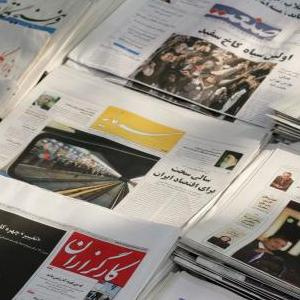Tehran's Daily Newspaper Review

The nosedive in the global stock markets attracted the most attention by the Iranian dailies.
Iran's banner headline came out of its interview with the newly appointed Minister of Oil Rostam Ghasemi who spoke of “attracting 40 billion dollars of investment in joint gas and oil fields”. Ghashemi added that the majority of the projects will be advanced in cooperation with domestic contractors. Iran also published a piece, titled “The Invisible Hand of Power and Wealth Centers”, on the fate of a bill suggesting monitoring the MPs’ financial record. In Iran’s editorial, Ali-Akbar Javanfekr elaborated on the difference between the utilitarian culture of the West and the Iranian ‘spiritual’ culture and the threat of the Iranian culture’s contamination by the former.
Jomhouri-e Eslami covered Zionists’ new “plot” to eradicate the Arabian language in the Occupied Territories. It also quoted Hashemi Rafsanjai who, on the anniversary of the victory of the Constitutional Revolution, had warned the clergy about history repeating itself and the threat of anti-cleric currents, thinly veiling a reference to Ahmadinejad's team. The newspaper spoke of “A Lesson for Arab Dictators” in its editorial; a lesson which they should learn before facing a same fate.
Arab dictators have the cage nightmare according to Kayhan. The newspaper also covered marches by the people of Bahrain and Yemen after the first Friday prayers in Ramadan, Ahmadinejad's interview with Euronews and the first meeting held by the Principlists’ “Committee for Unity”. Kayhan’s editorial probed the fundamental cause of Iran's ‘soft power’ in Middle East and the mechanism to utilize in social and judicial areas inside the country.
Resalat’s top headline was “US economy at the height of crisis”, accompanied by photos of Americans queuing for food, protests in front of the White House and anxious stock exchange agents. The newspaper also covered remarks by two major Principlist clerics, ayatollahs Mahdavi Kani and Mohammad Yazdi who have called for Principlists’ unity for the parliamentary election. Resalat’s editorial was a critique of Hashemi Rafsanjani’s remarks on the anniversary of the victory of the Constitutional Revolution, arguing that the Imperialism whose threats were underlined in Hashemi’s statements, actually sided with the Green Movement, supported by Hashemi, in 2009.
Shargh made an interview with former foreign minister, Manouchehr Mottaki, in which he stressed that “there is still a long way to go before we can have official greetings with the United States.” The newspaper also covered remarks by Seyyed Hassan Khomeini, Ayatollah Khomeini’s grandson, who had pointed to the tough living conditions of people. His remarks were largely overlooked by the conservative media. Shargh’s editorial was written by Hassan Kazemi Qomi, Iran's former ambassador to Iraq, on the challenges in the way of US staying in Iraq.
Trouble with understanding some terms? Check our Glossary of Iranian Political Terms.
Briefing
Hamshahri (Citizen) is the official daily newspaper of Tehran's Municipality. Its general directions in politics, culture and economy are determined by the mayor of Tehran, currently Mohammad Baqer Qalibaf.
Iran is the official organ of the administration.
Jomhouri-ye Eslami (The Islamic Republic) was known as the official organ of the Party of the Islamic Republic, founded in 1979 and disbanded in 1987. Currently, it is an open critique of Mahmoud Ahmadinejad's policies and is known to be a mouthpiece of Akbar Hashemi Rafsanjani.
Kayhan (Universe) is a hard-line conservative newspaper. Its editor-in-chief –currently Hossein Shari’atmadari- is appointed by Iran's Supreme Leader. Shari’atmadari’s editorials often spark off controversy and debate inside Iranian political circles.
Khabar (News) is a principlist daily newspaper which adopts a critical stance towards Ahmadinejad's policies.
Resalat (Mission) belongs to the moderate wing of the principlist camp. Resalat’s best known analyst is Amir Mohebbian, its political editor.
Shargh (East) is a moderate reformist newspaper. It was the most popular and influential reformist newspaper in its first period of publication which lasted from August 2003 until September 2006.
Tehran-e Emrooz (Tehran Today) is a ‘principlist reformist’ newspaper, connected to Mohammad Baqer Qalibaf.

